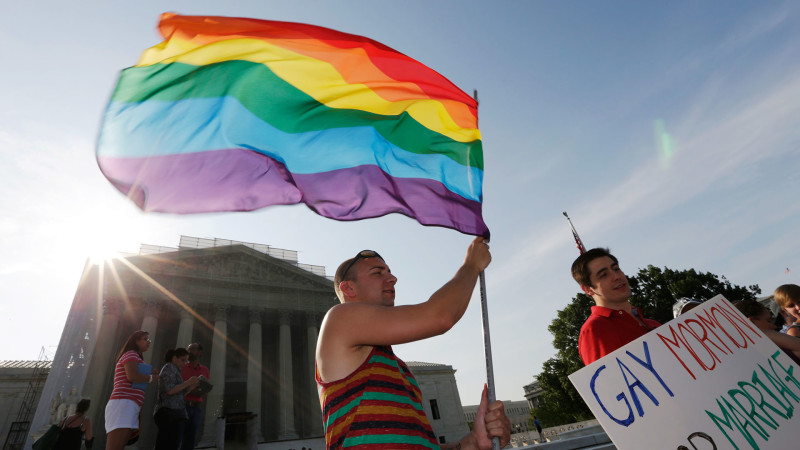"We were past the metal detectors, we were just a few feet away from the clerk and then our attorney was handed a one-page document," Beierle said. "Apparently it was Justice Kennedy telling us no."
She said the hardest part was calling her mom to tell her she wasn't going to be able to get married after all.
Rachael Beierle, who has had her last name legally changed, said the room was filled with emotions, but it was even more difficult listening to the children ask their parents what was going on.
"To hear a 4-year-old ask, 'Why, Mommy? Why can't you get married?'" she said. "We're asking the same questions.
There has been a flurry of legal activity over gay marriage this week.
On Monday, the U.S. Supreme Court refused an appeal, which effectively made gay marriage legal in 30 states.
Then Tuesday, the 9th U.S. Circuit Court of Appeals followed the Supreme Court's action with a ruling declaring that gay couples' equal protection rights were violated by the same-sex-marriage bans in both states.
Idaho Gov. C.L. "Butch" Otter said in a statement he was "pleased" with Justice Kennedy's early morning stay.
"I intend to be faithful to my oath of office and keep working to protect the Idaho Constitution and the mandate of Idaho voters in support of traditional marriage," Otter said.
Both Otter and Idaho Attorney General Lawrence Wasden filed emergency motions early Wednesday morning in an effort to delay Tuesday's ruling that declared gay marriage legal in Idaho and Nevada. Kennedy's order came just over an hour after the motion was filed.
It's unclear just how long the U.S. Supreme Court will keep the Idaho stay in effect.
"The next thing that is sure to happen is that the plaintiffs in this case will file their opposition to the stay, and then Justice Kennedy — probably sometime on Friday — will issue an opinion on whether the stay should be continued," said Shaakirrah Sanders, an associate law professor with the University of Idaho's College of Law in Boise.
The 9th U.S. Circuit's decision to make its Tuesday ruling effective immediately was unusual, Sanders said, because it removed the procedural grace period that parties to a case normally have to appeal. The stay from Kennedy could be less about wanting to consider the results of the case and more about reminding the 9th Circuit that it shouldn't skirt the rules, she said.
Officials at Lambda Legal, the gay rights advocacy organization that argued the Nevada case on behalf of eight same-sex couples, noted only Idaho sought the stay.
Jon Davidson, the group's legal director, had called for the nation's highest court to clarify whether Nevada can issue marriage licenses.
Pierceall reported from Las Vegas. Associated Press reporters Ken Ritter and Michelle Rindels in Las Vegas, Rebecca Boone in Boise and Paul Elias in San Francisco contributed to this report.
